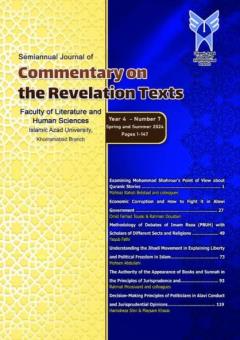The Authority of the Appearance of Books and Sunnah in the Principles of Jurisprudence and its Comparison with Hermeneutics
Subject Areas : Theological and philosophical criticism of religious-Islamic subjectsrahmat MOUSIVAND 1 , Abdulwahid Wafai 2 , عبدالرضا جمالزاده 3
1 - PhD Student of Jurisprudence and Fundamentals of Law, Islamic Azad University, North Tehran Branch, Tehran, Iran
2 - Assistant Professor, Department of Islamic Studies, Islamic Azad University, South Tehran Branch, Tehran, Iran
3 - گروه الهیات، دانشکده علوم انسانی، دانشگاه آزاد اسلامی واحد تهران شمال، تهران، ایران
Keywords: Principles of Jurisprudence, Hermeneutics, the Authority of Appearances, Understanding the Book and Tradition,
Abstract :
Understanding is a kind of cognition. Reading a text or hearing a speech is different from understanding it, and one may hear a speech or read a text, but not understand it. One of the important issues of religious sciences and humanities is understanding the meaning of the text. Hermeneutics is one of the branches of human sciences that discusses the theoretical foundations of text interpretation and understanding. In the discussion of the principles of jurisprudence, although the method of the Principlists is in the direction of trying to make the interpreter’s to reach the author's intention, there is no mention of the author's experience in the interpreter’s mind. In this article, with the analytical-argumentative method, it was found that according to the points of commonalities and differences between hermeneutics and the principles of jurisprudence, it became clear that there is a relationship and interaction between these two sciences. This relationship can result in the influence of one on the other. Some points of commonality can be used in the science of the Principles of Jurisprudence as the principles of the subject which are proven in the other science and help to reduce the issues raised in the science of the principles without the need to prove them in it.
آزاد، علیرضا؛ آزاد، تکتم؛ لعل روشن، فاطمه (1395). مبانی مشترک اصول فقه و هرمنوتیک کلاسیک در فهم متن، فصلنامه، فقه و اصول، سال 48، شماره 105.
احمدی، بابک (1400)؛ ساختار و تاویل متن، تهران: نشر مرکز.
انصارى، مرتضی (1419)؛ فرائد الأصول، قم: نشر اسلامى.
ایزدی نیا، حمیده و واعظی، اصغر (1393)؛ چالش گادامر و هرش بر سر معیار درستی تفسیر، فصلنامه حکمت و فلسف، دوره 10، شماره 39 .
بروجردى، حسین (1415)؛ نهایة الأصول، قم: نشر تفکر.
تورانی، اعلا و سلطان احمدی، منیره (1389)؛ تحلیلی بر رابطه هرمنوتیک روشی و فلسفی با تاویل و تفسیر قرآن کریم، آینه معرفت، دوره 8 ، شماره 23 .
حسینی شاهرودی، مرتضی و زنگویی، علی (1391)؛ مقایسه مهمترین دستاوردهای هرمنوتیک با سنت تفسیری اسلامی، تحقیقات علوم قرآن و حدیث، سال 9، شماره 17.
حقیقت، صادق (1377): یادداشتى درباره هرمنوتیک، کتاب و سنت، فصلنامه علوم سیاسی، دوره 1، شماره 1.
خیرجوی لاتی، صغری و علیمردی، محمدمهدی (1396)؛ مقایسه و تحلیل روششناسی هرمنوتیک قرآن علامه طباطبائی و دکتر نصر حامد ابوزید، الهیات تطبیقی، دوره 8، شماره 18.
روزبه، محمدرضا (1385)؛ هرمنوتیک، نشریه رودکی، شماره 2.
ربانی گلپایگانی، علی (1401)؛ هرمنوتيک منطق فهم دين، قم: کتابخانه مدرسه فقاهت.
زیمرمن، ینس (1398): هرمنوتیک؛ درآمدی کوتاه، ترجمه ابراهیم فتوت، تهران: کتاب کولهپشتی.
سلدن، رامان و ویدوسون، پیتر (1387)؛ راهنمای نظریه ادبی معاصر، مترجم عباس مخبر، تهران: طرح نو.
طاهری، صدرالدین(1379): بررسی انتقادی رابطه اصول فقه اسلامی و هرمنوتیک، مقالات و بررسیها، دوره 33، شماره 68.
مختاری، محمدحسین (1399)؛ خوانش تطبیقی قانونهای چهارگانه هرمنوتیکی بتی با برخی قواعد دانش اصول فقه، دو فصلنامه اصول فقه حوزه، شماره 5.
میرزاى قمى، ابوالقاسم (1378)؛ قوانین الأصول، قم: کتابفروشى اسلامیه.
نصرتیان اهور، مهدي (۱۳۹۲)؛ تبیین نقش و کارکرد ظواهر کتاب و سنت در اخلاق، سال 4، شماره ۱۴.
نیچه و دیگران (1398)؛ هرمنوتیک مدرن؛ گزینه جستارها، ترجمه بابک احمدی، تهران: نشر مرکز.
واینزهایمر، جوئل (1380): هرمنوتیک فلسفی و نظریه ادبی، ترجمه مسعود علیا، تهران: ققنوس.
هاوزر، آرنولد (1400)؛ فلسفه تاریخ هنر، ترجمه محمدتقی فرامرزی، تهران: انتشارات نگاه.


